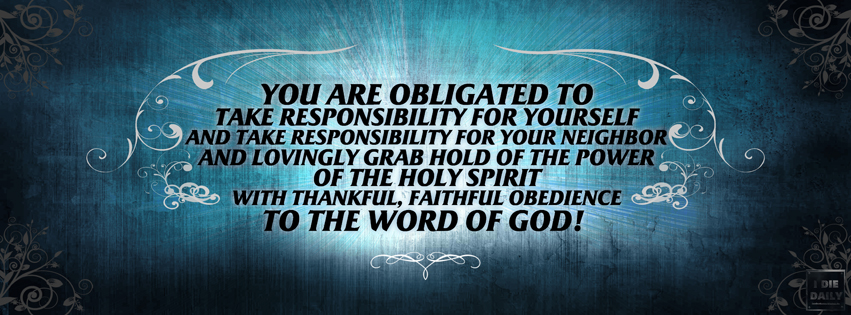 Recently, I created a graphic to the left with a quote from Phil Johnson’s Article, “A Primer on Hyper-Calvinism” and I posted it on social media. I was quickly swarmed with a somewhat hostile group of men claiming that this was not a working, acceptable definition for hyper-calvinism and that “common grace” was a heretical myth. I’ve publicly shared the same quote several times over the years, yet I’ve never had anyone react so corrosively over it. I did, however find an article online that explained the views against Phil’s quote much better than the hooligans that preferred to charge head-first, eyes-closed, “Heresy!” and resort to ad hominem personal attacks and circular reasoning. The article was written by Rev. Martyn McGeown from the Covenant Protestant Reformed Church and is titled, “An Answer to Phil Johnson’s “Primer on Hyper-Calvinism”” and it is very articulate. I’d rather engage with the article than go another round of verbal fisticuffs with the online debate version of the Dudley Boyz.
Recently, I created a graphic to the left with a quote from Phil Johnson’s Article, “A Primer on Hyper-Calvinism” and I posted it on social media. I was quickly swarmed with a somewhat hostile group of men claiming that this was not a working, acceptable definition for hyper-calvinism and that “common grace” was a heretical myth. I’ve publicly shared the same quote several times over the years, yet I’ve never had anyone react so corrosively over it. I did, however find an article online that explained the views against Phil’s quote much better than the hooligans that preferred to charge head-first, eyes-closed, “Heresy!” and resort to ad hominem personal attacks and circular reasoning. The article was written by Rev. Martyn McGeown from the Covenant Protestant Reformed Church and is titled, “An Answer to Phil Johnson’s “Primer on Hyper-Calvinism”” and it is very articulate. I’d rather engage with the article than go another round of verbal fisticuffs with the online debate version of the Dudley Boyz.
Now I’m not a pastor and I don’t have a degree of any kind, but I would like to ask a few questions that were not answered in McGeown’s article, point out a couple things that I noticed that seem worrisome to say the least, and make a couple new points along the way. However, I will also be addressing some other issues with hyper-calvinism, common grace, and Scott Price. Hopefully I’ll be able to provide some much needed perspective to the conversation.
To begin, I’d like to post some framework – quotes, Scriptures, and any other material that can provide a basis for understanding the conclusions I’ll draw later.
COMMON GRACE
“God has demonstrated His kindness to the whole world, the rain does fall on the just and the unjust. There is what theologians call “common grace.” Common grace is sunshine and rain, and a good meal, and love, and marriage, and children, and every beautiful thing in life. That’s common grace. That’s God loving all men in some way. And we are to literally fill the world with that common grace.
And if you go back in history you will find that Christianity has done that. Christians are basically the ones who have changed the world. Wherever you have had Christianity for centuries, you have the most advanced societies providing the most care for people. It was Christians who developed nursing hospitals; and all of that basically had its roots in the transformation the gospel made in people’s lives that caused them to reach out to care for people. If you go back in history to primitive cultures they were happy to behead each other and kill each other. Christians change the character of the world wherever they have gone, and that’s the way it absolutely should be.” – John MacArthur, “Bible Questions and Answers, Part 67“
I believe that the denial of common grace is an egregious error. The people I met who denied common grace became hostile very quickly (which is not a great way to facilitate healthy discourse or make a strong case for any position), defined the term on their own without listening or accepting any other definition, and then in less than 24 hours blocked me from explaining (which is why I’m writing this article). They’re somewhat bigoted, refusing to handle the information they were presented and then refusing to let anyone else define the terms. Their refutations were riddled with fallacies. Refuting their own version of common grace instead of the one presented – that is a strawman fallacy. They also employed false dilemma, attempting to force me to choose between “love and hate” as if the two were mutually exclusive; as if love and hate were polar opposites. They quoted,
James 4:6,
But He gives more grace. Therefore He says:
“God resists the proud,
But gives grace to the humble.”
and insisted that God’s love and grace only fall on the Elect. This is evidently the conclusion of many of those who have taken issue with Phil’s original article. Indeed, after McGeown lists a lengthy bulk of Scripture references and other quotes, he then concludes the same as the internet goons,
“Clearly, then, we see a pattern in New Testament preaching. Christ and the apostles preached indiscriminately, calling, commanding and urging all men to repent and believe, and promising believers—and only believers—rest, peace, salvation and eternal life. Christ and the apostles did not preach that God loves all men, that Christ died for all men and that God desires the salvation of all men head for head. Thus the New Testament rebukes both real hyper-Calvinists on the one hand, and Arminians with “free-offer Calvinists” on the other hand.”
Frankly, I find this sort of thing disturbing, and would agree with Phil Johnson that this is a widespread form hyper-calvinism and after reading the response from McGoewn I learned two things, (1) he has great writing skills and (2) he still misses the mark, demonstrably. And I believe the root of this, the core of this, is to look behind the scenes of Evangelism, because I believe that common grace stems from, or at least is a consequence of, the atoning work of Christ. Who did Christ die for? What did Christ’s death purchase for the Elect and for the reprobate? Because if you get the atonement wrong, then you’ll probably miss everything else. If you get the atonement right, hopefully you’ll see Christ’s varying love for all mankind.
Please note that it’s probably safe to say that these hyper-calvinists understand they are on the fringe. They seem to know they’re peddling doctrine that is not accepted by the calvinistic church at large.
“This is my guess, my estimation, somebody might have some better technical data on this, but I would say at least 90% of sovereign grace, calvinistic reformed people hold to the theory of common grace.” – Scott Price, “Chosen in Christ #37 The Myth of Common Grace,” 5-19-19
Scott Price seems to believe the problem with the rest of us, the 90%, is that we’re using the word “grace” to describe “providence.” I’ve heard some refer to common grace as “common mercy.” But, is there any issue with using the term “common grace?” Scott Price seems to believe that saying common grace is akin to saying a “cuss word.”
“And for those that have actually, uh, seen, it’s been revealed to them God’s, uh, purpose in Christ through His free and sovereign grace – just to hear those two words put together, ‘common’ and ‘grace,’ it’s almost like a cuss word or you think ‘you’re kidding me right? you’re joking” when you hear that. And that’s the way it was for me back as early as 1990. I was converted in ’87 and as I started reading I didn’t come across anything technical explaining about this ‘common grace’ and free offer stuff. But I knew a man that helped me out on kinda guiding me on what to read theologically – saved me alot of time and money. And he brought this up in a conversation, that there are actually these people that believe the doctrines of grace, the 5 points, that hold to this doctrine of common grace and the free offer. And after he explained it to me, I was shocked. I said, ‘Are you…’ I, I didn’t believe it.
I said that’s just Arminianism to me. And he said, um, I’ve told this story several times to the congregation here – he said, ‘that’s very astute.’ I said, ‘it just seems like common sense’ because it was easy to see. Um, so it wasn’t like I was well studied in the technicalities of the history of this doctrine, the in’s and out’s of it, it just seemed on it’s face to be heresy. So shortly after that we had a fella come in, um, named Charles Trukstrah from the PRC church and, uh, he did a message on each one, common grace and the free offer and countered it with, you know, what we hold to sovereign particular grace. So after that I was able to study and see more clearly the implications and particulars of these problems. And I’m thankful, back in 1994, um, those people bringing this to the surface so I could see it. Some things it’s odd to me, and I can’t control it God controls it, and He only knows why He does things in certain times You know, we wish we would’ve known something 20 years ago instead of just last week. Because it seems like things would’ve fit together better, it would’ve flowed better. God is in charge of that. So we can’t, um, I’m not going to argue with Him. ” – Scott Price, “Chosen in Christ #37 The Myth of Common Grace,” 5-19-19
Price affirms “sovereign particular grace” which he believes is, yet again with another false dichotomy, mutually exclusive to “common grace.” Notice a pattern here? It’s a high contrast black/white, either/or, love/hate way of thinking that seems to fuel the perception of God and Scripture in this way – missing the grey areas, missing the levels and high-definition distinctions, missing the complexities, and ultimately missing the mark.
The pattern we see here, is that their thinking is polarized before they even read the Scriptures. Scott Price seems to have been indoctrinated into this by the PRC church before he ever even got a chance to study and grasp a theologically accurate understanding of common grace. His eyes, his perception, is skewed through this false-dilemma-ridden filter before he ever had a chance to read Scripture without that lens. Sort of how parents can raise their children to be racist or narcissistic and once that doctrine sets in, the child just can’t seem to see things any other way. Notice Price says,
“And that’s the way it was for me back as early as 1990. I was converted in ’87 and as I started reading I didn’t come across anything technical explaining about this ‘common grace’ and free offer stuff……..Um, so it wasn’t like I was well studied in the technicalities of the history of this doctrine, the in’s and out’s of it, it just seemed on it’s face to be heresy.
Now, it seems, that Price can read the Word of God and can read texts that clearly show all the mercy and grace God shows the reprobate, yet refuses to call it grace. He must call it “providence” he says. He states,
“Now we won’t deny that God, we saw it in the text, that He provides all these things to everybody – in providence. But we know better than to call it ‘grace.'” – Scott Price, “Chosen in Christ #37 The Myth of Common Grace,” 5-19-19
“Where does this come from?” you might ask. How is it that price can see God’s providence, but his mind forces him to divorce God’s providence from God’s grace? Why the dualism? Why, in his mind, must it be either/or, all or nothing, one or the other, but not both? Is it that complicated, that God’s grace and mercy aren’t in competition with His providence? No.
Cameron Buettel writes on Grace to You (found here),
Some people appeal to God’s unconditional love as if that trumps or invalidates His other attributes, most notably His wrath. But as John [MacArthur] emphatically argues, such sentiment amounts to nothing less than a popular form of idolatry.
“Belief in a God who is all love and no wrath, all grace and no justice, all forgiveness and no condemnation is idolatry (worship of a false god invented by men)” – John MacArthur
People have this tendency to omit or overshadow one of God’s attributes in favor of another. In this case, the PRC, Scott Price, and Martyn McGeown have done that, overshadowing God’s grace with his providence. They’re cancelling God’s common grace and love of all men, in favor of a heavy-handed providence – as if we have to choose between grace and providence. Don’t fall for it. It’s their “either/or” thinking problem, their fallacy – but it doesn’t have to be yours.
Monergism.com (found here) gives this definition of common grace:
“Common Grace is a theological concept, primarily in Reformed and Calvinistic circles, referring to God’s common patience or forbearance with sinful man … the non-saving sustaining grace of God that is common to all humankind. It is “common” because its benefits are experienced by, or intended for, the whole human race without distinction between one person and another. It is “grace” because it is undeserved and sovereignly bestowed by God. In this sense, it is distinguished from the Calvinistic understanding of “special” or “saving” grace, which extends only to those whom God has chosen to redeem. An example of the concept can be found in the idea that God allows the sun to shine upon both the righteous and the unrighteous and sends rain on both the just and unjust.”
Did you catch that? “It is ‘grace’ because it undeserved and sovereignly bestowed by God.” Undeserved and sovereignly bestowed sounds like a very healthy, cohesive marriage of grace and providence. Also, the PRC idea of particular grace is captured in the larger calvinistic church’s doctrine of saving grace. The saving grace, or the special grace, is the particular grace of which they speak. So what’s with the semantic games? The only real issue here, is that they are denying that God has any love at all, any grace at all, any mercy at all for the reprobate. Yet, we are commanded to love our neighbor, love our enemies, and Christ obeyed the Law perfectly. Christ loved His neighbor. Christ loved His enemies. God is not a hypocrite commanding us to love people that He Himself doesn’t love. And how graceful is He! For through us, through His people, He pours out His love on the undeserving reprobate – that’s active, Spirit-driven, Scripture-commanded grace towards them!
In regeneration we are indwelt the Holy Spirit, when our affections, our will/volition is transformed, we are born again with a new heart, new desires, and more and more what God loves we love, and what God hates we hate. The Spirit conforms us to the image of Christ, and that’s how we are able to obey the commands of Scripture. We’re sanctified, set apart, as His Bride, becoming more and more like Christ. How on earth could we love our neighbor if Christ doesn’t love them too? How on earth could we love our enemies if God doesn’t love them too? Is that not grace – active, powerful, unmerited favor towards reprobates and the converted Elect and yet-to-be converted Elect alike?
What about “restraining grace?” Do they also reject that? I mean, not everyone is as bad as they could be. What other than God’s active, potent, powerful grace, in his providence (not set at odds with it like hyper-calvinists wrongly assert) could do such a thing?
John MacArthur writes (found here),
“What about the charge that the doctrine of election is not fair? In one sense, there’s some truth in this. “Fair” would mean that everyone gets precisely what he deserves. But no one really wants that. Even the non-elect would face a more severe punishment if it were not for the restraining grace of God that keeps them from expressing their depravity to its full extent.
Fairness is not the issue; grace is the issue. Election is the highest expression of God’s loving grace. He didn’t have to choose anyone. And He is, after all, God. If He chooses to set His love in a particular way on whomever He chooses, He has every right to do so.”
We cannot pit grace against providence. There is no internal warfare between God’s attributes. God’s attributes are not in competition with each other. Is it so hard to understand that saving grace is different from common grace? But the way they use a strawman is by conflating the two terms, misrepresenting the doctrine, and insisting that nobody but them are allowed to define this term “common grace.”
Tim Challies writes (found here),
“Why is it that after Adam and Eve sinned in the Garden and incurred the just penalty of death, they did not immediately die? What enabled them to go on living to enjoy the many of the benefits of life for years afterward (food, marriage, sex, children, etc.)? And why do so many sinners today enjoy those same benefits, even those who will never believe?
In general, we can answer by pointing to grace–a fitting description for every one of God’s blessing, each of which is, by very definition, undeserved. However, because the grace we are talking about here is poured out “on the just and on the unjust” (that is, on both believers and unbelievers–see Matthew 5:45), and since it is of a different kind than the other manifestations of grace we read about in Scripture (e. g. forgiveness of sin, adoption into the family of God, eternal life in heaven—that is, special grace, or graces related to redemption), theologians have found it helpful to distinguish this as common grace. It is common in that it extends to all people without distinction just as the common room at a university is accessible to every student.
As Wayne Grudem succintly defines it in his excellent Systematic Theology, “Common grace is the grace of God by which he gives people innumerable blessings that are not part of salvation.” Berkhof tells us what such grace accomplishes: “[It] curbs the destructive power of sin, maintains in a measure the moral order of the universe, thus making an orderly life possible, distributes in varying degrees gifts and talents among men, promotes the development of science and art, and showers untold blessings upon the children of men.” Thus common grace encompasses not only physical blessings like rain and food and health, but also blessings in the areas of intellect, morality, creativity, society, and religion. Like all grace, all undeserved favor, it is meant to point us to our kind, loving Creator.”
“In the Scriptures when the Bible speaks of salvation, it speaks of salvation in more than one way. We’re accustomed to using the term salvation for being saved in the ultimate sense of being redeemed by God and brought into a saving relationship to Him that will last for eternity. But in the Scriptures, for God to save somebody can mean several different things. The word “to save” refers to any act of rescue from a serious and dire circumstance, or from a calamitous situation. If you are restored from a life-threatening disease, you are saved. If you are rescued from capture in battle, you are saved. Any rescue from calamity is a kind of salvation biblically. Then there is the ultimate sense of salvation where in that regard the Great Calamity from which we are saved is from God. That is, we are saved from having to face God in His wrath on the day of Judgement. And we are rescued from that wrath which is to come. God is at the same time the Savior and the One from Whom we are saved.”
“For he makes his sun rise on the evil and on the good, and sends rain on the just and on the unjust.”
“Common grace refers to the kindness and benefits and favors that God pours out liberally to people whether they are believers or not believers. But we’re not just talking here about rain. We’re talking about a multitude of favors that are enjoyed by people who are not in fellowship with God through personal redemption. And we see that these things that God gives, gifts of life and health and safety and order and all the rest that we need to survive, is something that God does in order to preserve His creation.From the fall of man, God did not utterly destroy the whole human race, but He has preserved the human race even to this day. And we have seen a progress in history of the impact of God’s grace on just simply the standard of living of people. I know that not every one in this world enjoys an equal standard of living. Not every one in America has the same standard of living, and certainly the basic standard of living in America is much greater than other parts of the world where people live in abject poverty and severe deprivation. Nevertheless, even in those areas the life expectancy and the quality of life tends to be significantly better than it was for the masses of the populated areas of the world in centuries past. So that just life itself has become easier and better as it were, as the progress of history. And not the least of the reasons that has provoked the improvement of life and the conditions of life, and many people contribute simply to science or the secular enterprise of education – we have to look to the influence of the Christian church on the world over the past 2000 years.”
“The Church is always called, and the Christian is called to imitate Christ as Christ imitates God. And as Christians, engaged in the Christian life, we are called to be imitators of God. That’s what it means to be made in the image of God. And if God is concerned about common grace, the general welfare of the human race, what is our responsibility? We are also called to be concerned about the general welfare of the human race. In fact, Jesus says if your neighbor, or even in this case if it’s your enemy, is naked – you clothe him, if he’s hungry you feed him, and if he’s thirsty you give him drink, if he’s in prison you go and visit him, if he’s sick you minister to him, and we see Jesus demonstrating in His ministry, for example, the parable of the good Samaritan indicates the priority that Jesus gives to His Church to be concerned not only in the special grace realm of evangelism, but also to be concerned about the general welfare of the human race.What does James tell us, that the essence of true religion is the care of orphans and widows. Now, I labor this point for a reason. That there has been a strange divorce that has taken place in the last hundred or so years in the Christian community. A crisis occurred in the 19th century, with the advent of 19th century liberal theology, which by and large rejected the supernatural aspects of the Christian faith – denied the virgin birth, denied the resurrection, denied the atonement, the deity of Christ and so on.And they had a crisis because they had basically rejected historical Christianity, and yet they had tons of money invested in careers and in church buildings and programs and institutions all over the place. And so in order for them to remain viable, from a social perspective, they had to create a new agenda for the church. Well, they said we already have an agenda, and it’s the humanitarian outreach concerns, the ministries of mercy, and they began to put their emphasis on taking care of the social agenda at the expense of evangelism. And orthodox Christians were saying, “Wait a minute! The Church is still about the supernatural questions of personal reconciliation and we’ve got to almost double our efforts for evangelism to make up for the repudiation of it that is coming from the liberal wing.”And this unnatural schism took place, where evangelicals began to say, “Oh social action? Social concern? Concern for the general welfare of the human race? That’s a liberal matter. That’s a liberal agenda. Whereas concern for souls and personal salvation, that’s the real concern of the Church. If Christ would hear that – He would say “apox on both of your houses!” Because the Church is called not only to the ministry of special grace, but also to the ministry of common grace.
COMMON GRACE AND THE ATONEMENT
It is my belief, that Christ’s atoning work on the cross purchased varying levels of grace for all men, not just the Elect.
Christ’s died for the eternal salvation of some (obviously), but all benefit to some degree from temporal salvation – His grace, love and the presence of the Holy Spirit and the Gospel of Christ being spread throughout the world. Christ died for all in a general sense, and Christ died for His elect, His Bride, in a salvific sense.
Spurgeon said this:
“We believe that by His atoning sacrifice, Christ bought some good things for all men and all good things for some men. And that when He died He had a definite purpose in dying and that His purpose will certainly be effected.”
Paul said in 1 Corinthians 9:22,
“To the weak I became weak, that I might win the weak. I have become all things to all people, that by all means I might save some. I do it all for the sake of the gospel, that I may share with them in its blessings.”
Matthew 20:28 says,
“even as the Son of Man came not to be served but to serve, and to give his life as a ransom for many.”
Phil Johnson writes,
“Again as 1 Timothy 4:10 plainly says: “Christ is the Savior of all men” but He is not the Savior of all men equally. He did not die for each and every individual alike. “I am the good Shepherd,” Jesus said in John 10:11, “and the Good Shepherd gives His life for the sheep.” And the context makes His meaning inescapable. The good Shepherd does not die for the goats in the same way. He doesn’t die for the wolves like He dies for the sheep. Verse 15 He says, “I lay down my life for the sheep.” And in the Apostle Paul’s speech to the elders of Ephesus, Acts 20:28, he says this: “Take heed therefore unto yourselves and to all the flock over which The Holy Ghost has made you overseers to feed the Church of God which He has purchased with His own blood.” It was the Church that Christ purchased with His blood. They, the church, not the grievous wolves that were threatening the Church but the people of God, His elect. They were object of Christ’s affection and their salvation was the main reason for which He died. And the benefits that accrue to the reprobate are just secondary effects of that.
Here’s the real issue in the atonement. Now in what sense did Christ purchase the Church? In Ephesians 5 Paul uses language that evokes the imagery of a marriage price. Ephesians 5:25, “Husbands love your wives just as Christ also loved the Church and gave Himself up for her.” Not for her enemies, but for her. So Christ bought the Church with His own blood. For what reason, Ephesians 5:26-27, “that He might sanctify her and having cleansed her by the washing of water with the Word, that He might present to Himself the Church and all her glory having no spot or wrinkle or any such thing that she should be holy and blameless.”
Taken from Monergism.com (found here), Louis Berkhof writes,
Reformed theologians generally hesitate to say that Christ by His atoning blood merited these blessings for the impenitent and reprobate. At the same time they do believe that important natural benefits accrue to the whole human race from the death of Christ, and that in these benefits the unbelieving, the impenitent, and the reprobate also share. In every covenant transaction recorded in Scripture it appears that the covenant of grace carries with it not only spiritual but also material blessings, and those material blessings are generally of such a kind that they are naturally shared also by unbelievers. Says Cunningham: “Many blessings flow to mankind at large from the death of Christ, collaterally and incidentally, in consequence of the relation in which men, viewed collectively, stand to each other.”[Hist. Theol. II, p. 333.] And it is but natural that this should be so. If Christ was to save an elect race, gradually called out of the world of humanity in the course of centuries, it became necessary for God to exercise forbearance, to check the course of evil, to promote the development of the natural powers of man, to keep alive within the hearts of men a desire for civil righteousness, for external morality and good order in society, and to shower untold blessings upon mankind in general. Dr. Hodge expresses it thus: “It is very plain that any plan designed to secure the salvation of an elect portion of a race propagated by generation and living in association, as is the case with mankind, cannot secure its end without greatly affecting, for better or for worse, the character and destiny of all the rest of the race not elected.” He quotes Dr. Candlish to the effect that “the entire history of the human race, from the apostasy to the final judgment, is a dispensation of forbearance in respect to the reprobate, in which many blessings, physical and moral, affecting their characters and destinies forever, accrue even to the heathen, and many more to the educated and refined citizens of Christian communities. These come to them through the mediation of Christ, and coming to them now, must have been designed for them from the beginning.”[The Atonement, pp. 358 f.] These general blessings of mankind, indirectly resulting from the atoning work of Christ, were not only foreseen by God, but designed by Him as blessings for all concerned. It is perfectly true, of course, that the design of God in the work of Christ pertained primarily and directly, not to the temporal well-being of men in general, but to the redemption of the elect; but secondarily and indirectly it also included the natural blessings bestowed on mankind indiscriminately. All that the natural man receives other than curse and death is an indirect result of the redemptive work of Christ.[Cf Turretin, Opera, Locus XIV, Q. XIV, par. XI; Witsius, De Verbonden, B. II, Kap. 9, s. 4; Cunningham, Hist. Theol. II, p. 332; Symington, Atonement and Intercession, p. 255; Bavinck, Geref. Dogm. III, p. 535; Vos, Ger. Dogm. III, p. 150.]
OFFER and CALL (not offer vs command)
McGoewn titles one segment, “Offer/Invitation Versus Command,” and titles another, “The Gospel Offer or Serious Call?” which creates a false dichotomies pitting “offer” against “command” and pitting “offer” against “serious call.” He takes issue with Phil’s use of the word “offer” and lists out several verses from Scripture that describe a “call.” This, says McGoewn, refutes any possibility of an offer. But what McGoewn doesn’t do is quote or handle Phil’s description of said offer in context.
Here’s what Phil Johnson wrote in his article:
“2 Corinthians 5:20: “Now then we are ambassadors for Christ, as though God did beseech you by us: we pray you in Christ’s stead, be ye reconciled to God.“ The whole thrust of the gospel, properly presented, is to convey an offer (in the sense of a tender, a proffer, or a proposal)” of divine peace and mercy to all who come under its hearing.
Now here’s what McGoewn quotes and writes in his article:
“A command is something very different from an offer, even if sometimes an offer or an invitation is couched in the language of a command, that is, in the imperative mood (“Come!” “Take,” etc.). Johnson writes, “The whole thrust of the gospel, properly presented, is to convey an offer (in the sense of a tender, a proffer, or a proposal) of divine peace and mercy to all who come under its hearing.”
But that is not what the gospel call is!”
Notice anything suspicious? You should. McGoewn omits the 2 Corinthians 5:20 verse from his article and never handles the Scripture at all. He quotes Phil out of context, as if he had no biblical basis for defending “offer.” McGoewn simply lists out every verse he can find that doesn’t sound like an “offer,” and writes at length on the Greek “Kaleo” (call), but spends no time at all handling Phil’s actual argument. Seems a bit dishonest to me.
This is yet another fallacy, another false dilemma. Trying to force us to choose between “offer” and “call,” when in reality that’s not a choice we have to make at all. Scripture clearly indicates both.
So much more could be said here, but I’ll just leave a link to several other writings on Common Grace. And if someone wants to refute the teaching of common grace, they’ll need to handle the material first and actually handle the Scripture being provided. Ignoring the entire doctrine and making up your own terms is merely a strawman. I do believe that those rejecting common grace have a truncated Gospel – a bitter message void of the love and grace of God towards all men. One that blurs the full spectrum of the effects of the atonement. One that requires the threadbare overuse of fallacies like false dichotomy. Oh the irony, as they whiz by doing online ad hominem&block hit&runs, and as Scott Price put it, condemning “at least 90% of sovereign grace, calvinistic reformed people” who “hold to the theory of common grace” as heretics. To think, that Martyn McGeown, in an attempt to defend the PRC, wrongly condemned so many.
CLICK HERE FOR SEVERAL MORE DOCUMENTS REGARDING COMMON GRACE ON MONERGISM.COM

















